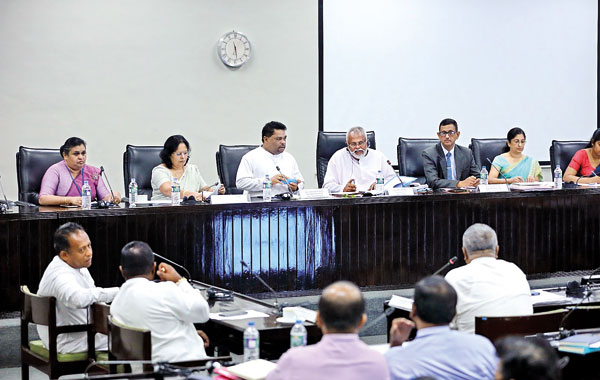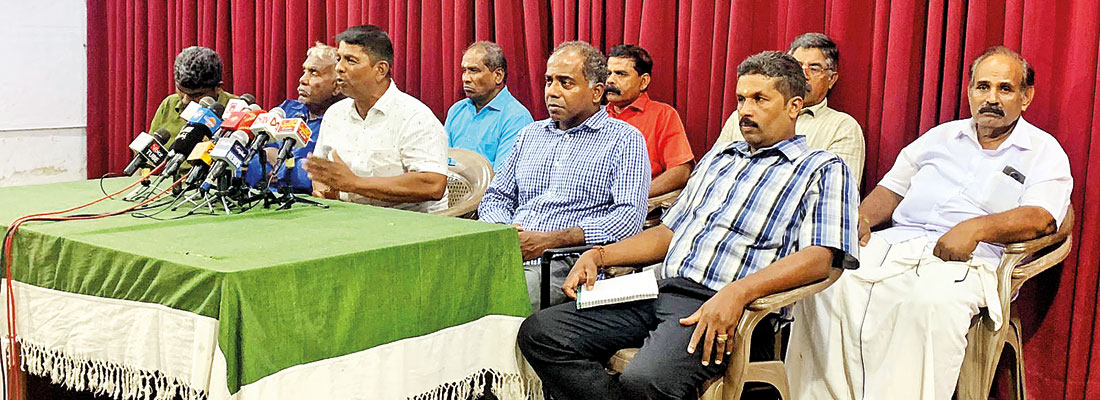News
Fishermen across the country fear new Fisheries Act will sink their livelihoods
View(s):By S. Rubatheesan
More than 20 cooperative societies from the North, South, and Eastern Provinces met in Jaffna on Friday to discuss the proposed Fisheries Act and the pressing issues the community faces across the country.
Annalingam Annarasa, Secretary of Kayts Fishermen Cooperative Society, said that the new legislation proposes providing fishing permits for foreigners to engage in fishing activities in Sri Lankan territorial waters.

Minister Douglas Devananda at a Ministerial Consultative Committee meeting on Fisheries last week
“We are already subjected to Indian poaching on a daily basis, making it incredibly difficult for us to make ends meet in the North now. If this new act comes into effect, it would be the final nail on the livelihood of our community,” Annarasa told the Sunday Times.
Questioning the timing of introducing the new Act, the northern-based fishermen leader alleged that under the proposed legislation, the Director General of Fisheries is vested with enormous powers, including powers to grant licences to foreigners and the private sector when it comes to utilising fisheries resources.
“The ongoing economic crisis, the fuel price hike, and the Indian poaching issue have already made our livelihood very challenging for our survival. We will not allow attempts that would lead to robbing of our traditional fisheries resources for multinational companies in the name of foreign investments,” Annarasa said, stressing that they have decided to take up their concerns on the proposed act with the Ministry directly.
Representatives from fishermen’s cooperative societies in Negombo, Matara, Chilaw, Puttalam, Jaffna, Kilinochchi, Mannar, Mullaitivu, Batticaloa, and Trincomalee participated in the meeting. Recently, a group of Northern fishermen visited the South, seeking solidarity from their southern counterparts on common issues they faced.

Northern fishermen Unions addressing a news conference in Colombo last week
A petition detailing issues they faced in the northern province was also handed over to Marc-André Franche, UN Resident Coordinator in Colombo.
The fisherfolk unions also expressed their disappointment over the inadequate allocation for the fisheries sector in Budget 2024, which was submitted to Parliament last month. Stressing that 35 percent of the country’s fish harvest comes from the northern sea alone, President Ranil Wickremesinghe, who is also the Minister of Finance, announced in his budget speech that Rs 500 million will be allocated to improve the sector in order to increase the productivity and livelihood of fishermen’s families.
The President also indicated that the Government will cooperate with the private sector in the management of fishing ports and necessary infrastructure, including the development of warehouses, to reduce waste and optimise productivity.
To develop the freshwater fisheries and aquaculture sectors, which contribute to 29 percent of the total fisheries harvest, Rs 200 million has also been allocated to develop some 12,000 permanent and temporary reservoirs in the country.
Addressing a media briefing in Colombo recently, a senior lecturer at the University of Jaffna and an advisor to northern fishermen cooperative unions, Ahilan Kadirgamar, said that the new Fisheries Act draft is of serious concern and poses an existential threat for the fisherfolk communities as they are still trying to come out of multiple crises, including the global pandemic and recent economic hardships.
“This is not the time to bring this Act. It gives prominence to multinational fishing operations and licences for foreign vessels to engage in fishing in Sri Lankan waters. This not only affects the fishing industry alone but the country as a whole,” Dr. Kadirgamar stressed.
Meanwhile, Fisheries Department Director General S.J. Kahawatta told the Sunday Times that the Act is being proposed in keeping with global fishing standards by repealing the current Fisheries and Aquatic Resources Act No. 2 of 1996 and incorporating the amendments that were introduced later.
“Our main Act—the Fisheries and Aquatic Resources Act—was introduced 27 years ago, and over 100 regulations were introduced from time to time as required in the changing fisheries sector. The proposed Act is formulated to ensure smooth regulatory and administrative procedures are brought under one legislation,” Mr. Kahawatta said.
He stressed that the department had conducted district-level multi-stakeholder’ meetings that included fishermen’s unions and federations to brief them on the proposed legislation. “We have not finalised the bill yet; if anyone has any concerns, they can inform us in order to be considered by the department.”
Addressing the Ministerial Consultative Committee on Fisheries last week, the Fisheries Minister Douglas Devananda said that the longstanding issue of Indian fishermen engaging in illegal fishing in the northern sea should be resolved at the diplomatic level between the two governments while stressing the support from other parliamentarians representing the Northern Province.
Senior Navy officials who were present at the meeting said that the presence of Indian fishermen in the the Northern sea had reduced significantly due to the navy’s continuous arrests in recent months.
| What the recently passed amendment entails The newly passed amendment to the Fisheries and Aquatic Resources Act No. 27 of 2023 introduced fresh clauses targeting further combating Illegal, Unreported and Unregulated (IUU) fishing activities in the territorial waters. The amendment, which came into effect on November 17 after being passed in Parliament, expands the scope of prosecuting the offence of illegal fishing by Sri Lankan vessels in another country’s territorial waters. Since there is no clear interpretation given in Section 14 of the original act on who is the ‘licence holder’, the new act stresses that in addition to the person who obtained the licence to engage in fishing in high seas, the skipper, crew, and any individual onboard the vessel engaging in fishing in another country’s water are guilty of the punishable offence. The Fisheries Department’s Director General has adequate powers to suspend the licences of vessels that are found to be engaged in IUU fishing activities after calling for an inquiry. The new act also recognises Coast Guard officials as ‘ Authorised Officers’ in addition to Fisheries Department officers and Tri Force (Police, Army, and Air Force) personnel not below the rank of Sergeant and Navy officers not below the rank of Petty Officer, to take action against IUU fishing activities in the coastal regions.
| |
| Highlights of the proposed actThe proposed new Act seeks to repeal the Fisheries and Aquatic Resources Act No 2 of 1996 and incorporate some 100 amendments that were introduced over the years on fisheries management, administrative processes, and obligations under international treaties into a single piece of legislation.The 159-page draft Act is divided into 13 parts, with 179 sections covering fisheries administration, licensing systems, fisheries management, and conservation methods. Under the proposed Act, the Minister is empowered to make regulations to grant permits for foreign vessels to engage in fishing in Sri Lankan waters directly or through joint ventures. The Minister can also declare designated parts of Sri Lankan territorial waters for local boats to engage in fishing, whereas no foreign vessel will be allowed to operate. Any Sri Lankan national planning to serve in a foreign-flagged fishing vessel and registered under section (35) of this Act can apply for a licence from the office of the Director-General. “However, such licence shall not entitle any fisher to be employed in another state pertaining to any fishing or fishery-related activities,” the draft clause reads. Among the key features of the proposed legislation is “Fisheries Management,” where the Director General is vested with more powers to grant or terminate licences for fishing and determine fishing grounds with recommendations from the National Aquatic Resources Research and Development Agency (NARA). The Director-General shall determine the total allowable catch or total level of fishing effort for any fishery and adopt such other conservation and management measures within Sri Lankan waters as may be necessary to ensure the conservation and long-term sustainability of the resource, one clause reads. The draft copy is available for public access on the website of the Department of Fisheries, and the public can express their concerns and suggestions to the department. |
The best way to say that you found the home of your dreams is by finding it on Hitad.lk. We have listings for apartments for sale or rent in Sri Lanka, no matter what locale you're looking for! Whether you live in Colombo, Galle, Kandy, Matara, Jaffna and more - we've got them all!

